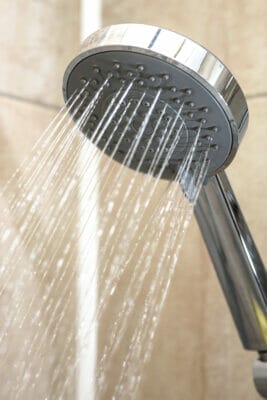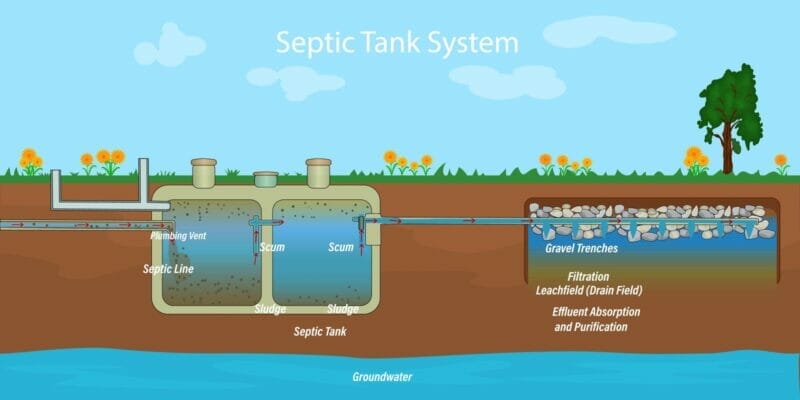Disclaimer: This post may contain affiliate links, meaning we get a small commission if you make a purchase through our links, at no cost to you. For more information, please visit our Disclaimer Page.
Long showers aren’t bad for septic systems per se, but they can be part of a wider water usage problem that can damage your septic tank. If you can balance the high water usage from long showers by using less water in other household tasks, you won’t notice any problems with your septic system.

Table of Contents
Should You Shower with a Septic Tank?
It’s common knowledge that all the water from every shower in your bathroom ends up in the septic tank if you have one. If you haven’t conducted extensive research about showering with septic systems, it’s hard to tell if this is a good or a bad thing.
Septic tanks are designed to hold wastewater, but they have a limited size. If you overload your septic tank with too much water, it will inevitably cause many issues.
Since the water from a shower is also wastewater, you may assume that your septic tank should handle it naturally, but you may be wrong.
While an undefective septic tank system should be able to handle regular showers just fine, it starts to struggle when the showers continue for extended periods, supported by excessive water usage in other parts of the house.
Taking long showers and washing laundry on a regular basis, for example, can only hasten the end your septic tank. If you don’t get your septic system serviced on a regular basis, you should anticipate the septic tank to degrade faster.
In essence, showering with a septic tank is not a bad practice in and of itself; it’s one of the reasons why septic systems exist! However, taking long showers coupled with excessive water usage around the home will quickly fill up the tank, unearthing other problems.
Are Long Showers Bad for Septic Systems?
Most times, a faulty septic system isn’t a result of a single bad practice; it’s usually a result of continuous bad practice over the years. So, running a couple of gallons of water through your septic system isn’t going to damage it immediately.
There are many reasons why your septic tank may be leaking or damaged, and running excess water through it at a time is one of the common reasons for damage to a septic water system.
Septic systems are designed to handle a specific flow of water that’s dependent on where they’re located. Therefore, an industrial septic system will be capable of discharging more gallons of water per hour than a septic system designed for home use.
However, when a septic tank is made to handle more water than it’s meant to handle, many problems may occur. Usually, it’s back into your bath or into your lawn, which isn’t exactly a great experience.
A well-designed septic tank for home use should be able to handle long showers just fine. But when many people take long showers for extended periods, discharging the water becomes tasking, causing a whole lot of problems.
Similarly, long showers aren’t bad for septic systems per se. Combining long showers with other activities that require using a lot of water is the culprit that you need to watch out for.
Can You Overwhelm a Septic System?
Septic tanks aren’t failsafe. You may have been using it comfortably for years with no sort of maintenance or repair, but that doesn’t mean you cannot damage or overwhelm a septic system.
There are a couple of things that are very damaging to a septic system. If you’re looking to damage your septic tank (which nobody wants), here are some activities that can accelerate the process.
Excessive water flow
The whole myth of long showers destroying septic systems has its root in this fact. It’s no secret that overloading your septic tank with too much water will lead to many problems.
All the water that’s being used in a house flow to the main pipe to converge in the septic tank. This makes it possible to overwhelm your septic tank, even if you don’t spend hours in the shower.
From this, it’s evident that the best way to avoid overwhelming a septic tank is by regulating the amount of water being used in the house every day.
You can make this task easier by installing water limiters, or by limiting access to hot water. This way, most people will be unwilling to take long showers.
Not pumping the septic tank
When using a septic tank, people unintentionally flush some solid waste that can’t percolate through the septic system. This solid waste may cause blockage in the septic system, preventing the efficient discharge of water.
Homeowners are expected to deal with this by pumping the septic tank every few years. Typically, you will need a pump every 3-5 years or even sooner, depending on how much water you use every day.
If you don’t want dirty water pumping back into your bath due to a blockage, you may want to pump your septic tank whenever it’s due. At least, that’s more cost-effective than having to fix it after suffering damage.
Flushing solid waste through your toilet
If you read up to this point, you already know that all the sewage from your home goes through the septic system.
An exception to this is toilet paper, which is a perfectly safe material to flush through your toilet.
However, anything other than toilet paper and sewage should never go through a septic system.
Flushing everything that ‘fits’ through your toilet will only overwhelm your septic system, leading to blockage and other problems.
Using strong cleaners
A septic system relies heavily on natural decomposition by organisms like bacteria to work efficiently.
Imagine constantly flushing antibacterial cleaners and disinfectants through your septic system; you’re indirectly killing the bacteria!
While it doesn’t hurt to use bleach or antibacterial soaps now and then, you have to exercise caution while using them, as you’re aware that their qualities can alter the balance of the bacteria in your septic system.

How to Maintain a Septic System
If you take long showers now and then, you may want to practice some additional maintenance tips to ensure your septic system works flawlessly for almost forever.
For the most part, the process of maintaining a septic system involves avoiding all the practices that can overwhelm the system. Since most of these practices are already listed in the previous section, there isn’t very much to say here anymore.
But in addition to avoiding the ‘bad practices’ above, you should also endeavor to fix leaking toilets as soon as you discover them.
Leaks could let away an insane amount of water, which contributes to your total water usage, overwhelming your septic system without you even trying.
It also helps to avoid letting the water run continuously while doing basic tasks like brushing. Turning the tap on only when you need to use the water can potentially save you gallons of water every day.
Doing your laundry all at once can also be damaging to your septic system.
Since the system is designed to handle specific water amounts per hour, spreading out your laundry loads will also spread out the water usage, giving the septic system some breathing space before receiving another load.
